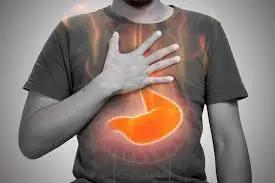Acid reflux, also known as gastroesophageal reflux disease (GERD), is a digestive condition that affects millions of people worldwide. Acid reflux happens when stomach acid flows back into the oesophagus, causing a burning feeling, bloating, discomfort, and potential long-term damage to the oesophageal lining. While medications can provide relief, managing acid reflux through dietary modifications is often the first line of defence
Let’s look at foods and eating habits that are common triggers for acid reflux, explore the science behind their impact, and provide guidance on how to navigate the acid reflux diet. By understanding whats behind your acid reflux, you can take steps to prevent symptoms and maintain a healthier, more comfortable lifestyle.
Understanding the acid reflux mechanism
To manage acid reflux, it’s essential to understand the mechanism behind this condition. Acid reflux occurs when the lower esophageal sphincter (LES), a muscle that acts as a valve between the stomach and esophagus, becomes weakened or relaxes inappropriately. This allows stomach contents, including acid, to flow back up into the esophagus, leading to the classic burning sensation known as heartburn.
Several risk factors can cause the weakening or improper functioning of the LES, including pregnancy, obesity, hiatal hernia, and certain medications. Additionally, specific foods and beverages can trigger or exacerbate acid reflux, by directly affecting the LES or increasing the production of stomach acid.
Common acid reflux trigger foods
Identifying and avoiding trigger foods is a vital part of an effective acid reflux management strategy. While the specific culprits may vary from person to person, certain foods and beverages have been consistently linked to increased acid reflux symptoms.
Fatty and fried foods
Fatty foods are known to be a major trigger for acid reflux. Foods high in fat, such as fried foods, butter, creamy sauces, and fatty meats, can slow down the stomach’s emptying process. This increases the risk of the stomach contents backing up into the esophagus. Individuals are advised to limit their intake of fatty foods and opt for lean meats to manage their symptoms effectively.
Spicy foods
Spicy foods can irritate the esophagus and exacerbate the symptoms of acid reflux. These foods often increase stomach acid production, which can lead to discomfort. People with GERD are generally recommended to moderate their consumption of spicy food to avoid triggering symptoms.
Citrus fruits and tomatoes
Acidic foods, including citrus fruits (oranges, grapefruits, lemons) and tomatoes, can irritate the oesophageal lining and exacerbate acid reflux symptoms. The acidity in these foods can contribute to the burning sensation associated with heartburn.
Chocolate
Chocolate contains ingredients that can relax the LES, allowing stomach contents to flow back into the esophagus more easily. Chocolate’s high-fat content can further aggravate acid reflux.
Caffeine and alcohol
Drinks containing caffeine, such as coffee, tea, and soda, can weaken the LES and stimulate the production of stomach acid. Alcohol can also relax the LES and irritate the esophageal lining, leading to increased reflux symptoms.
Carbonated drinks
Fizzy drinks can also contribute to acid reflux by causing the stomach to expand, which puts additional pressure on the LES. The expansion of the stomach caused by these drinks can be enough to trigger discomfort for some people, making it wise to opt for non-carbonated alternatives.
Onions and garlic
These are known to relax the LES, potentially triggering acid reflux episodes. They may also increase the production of stomach acid, further contributing to the problem.
Peppermint
While peppermint can provide relief for some digestive issues, it can also have a relaxing effect on the LES, making it a common cause for acid reflux.
Personalised approach to the acid reflux diet
Not all individuals will react the same way to trigger foods. The impact of certain foods can vary depending on factors, such as the severity of the acid reflux, overall digestive health, and personal sensitivities.
To determine your trigger foods, keep a detailed food diary. Record the foods and beverages you consume, as well as the timing and severity of any reflux symptoms that follow. This can help you identify and pinpoint the specific items that make your condition worse.
Once you’ve identified your personal triggers, you can adjust your diet. Start by eliminating the problematic foods and gradually reintroduce them one at a time to gauge their impact and to find the right balance for you.
Strategies for an acid reflux-friendly diet
Here are some additional strategies to help manage your condition:
Eat smaller, more frequent meals
Opt for frequent and smaller meals throughout the day to ease the burden on your digestive system.
Use smaller plates and bowls
This can help in feeling satisfied with smaller portions of food.
Slow down eating
Putting down your utensils between bites gives time for the receptors in the stomach to signal fullness to the brain, helping to prevent overeating.
Time your meals wisely
Avoid eating large meals close to bedtime. Lying down with a full stomach can exacerbate acid reflux. Aim to finish your last meal at least 3 hours before you plan to lie down or go to sleep.
Focus on nutrient-dense, low-fat foods
Choose nutrient-rich, low-fat options, such as lean proteins, whole grains, fruits, and vegetables. These foods are easier to digest and less likely to trigger acid reflux.
Stay hydrated
Drinking water can help to dilute stomach acid and with the movement of food through the digestive tract, potentially reducing reflux episodes.
Introduce ginger and chamomile
Ginger and chamomile are anti-inflammatory agents that may help soothe the esophageal lining and reduce acid reflux symptoms.
Managing acid reflux with lifestyle changes
Addressing lifestyle factors can play a significant role in managing acid reflux. Consider the following:
Maintain a healthy weight
Excess weight, particularly around the abdomen, can increase abdominal pressure and contribute to reflux. Losing even a few pounds can provide substantial relief.
Quit smoking and limit alcohol consumption
Smoking and excessive alcohol consumption can weaken the LES and exacerbate reflux symptoms. Quitting smoking and limiting alcohol intake can be highly beneficial.
Elevate the head of your bed
Sleeping with the head of your bed elevated can help gravity keep stomach contents from flowing back into the esophagus during the night, reducing nighttime reflux episodes.
Avoid tight-fitting clothing
Wearing loose-fitting, comfortable clothing can help minimise abdominal pressure and facilitate proper digestion.
Seeking medical advice and treatment
If your symptoms persist or worsen despite implementing these changes, it’s essential to consult with a healthcare professional.
Your doctor may recommend over-the-counter or prescription medications, such as antacids, H2 blockers, or proton pump inhibitors, to help reduce stomach acid production and reduce symptoms. In severe cases, your doctor may also consider surgical options, to strengthen the LES and prevent reflux.
Conclusion
By identifying your personal trigger foods, adopting an acid reflux-friendly eating pattern, and making lifestyle changes, you can take control of your condition. With the right strategies, you can manage your acid reflux and enjoy a more comfortable, symptom-free life.
Sources
- Acid Reflux & GERD: Symptoms, What It Is, Causes, Treatment
- Acid Reflux (GER & GERD) in Adults – NIDDK
- Diet Changes for GERD – About GERD
- Eating, Diet, & Nutrition for GER & GERD – NIDDK
Medical Disclaimer
NowPatient has taken all reasonable steps to ensure that all material is factually accurate, complete, and current. However, the knowledge and experience of a qualified healthcare professional should always be sought after instead of using the information on this page. Before taking any drug, you should always speak to your doctor or another qualified healthcare provider.
The information provided here about medications is subject to change and is not meant to include all uses, precautions, warnings, directions, drug interactions, allergic reactions, or negative effects. The absence of warnings or other information for a particular medication does not imply that the medication or medication combination is appropriate for all patients or for all possible purposes.









